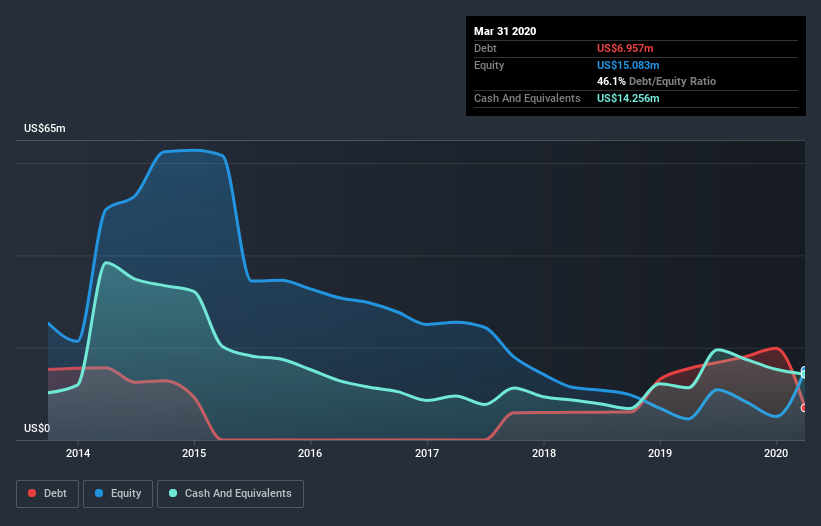Is iCAD (NASDAQ:ICAD) Using Too Much Debt?

The external fund manager backed by Berkshire Hathaway's Charlie Munger, Li Lu, makes no bones about it when he says 'The biggest investment risk is not the volatility of prices, but whether you will suffer a permanent loss of capital.' When we think about how risky a company is, we always like to look at its use of debt, since debt overload can lead to ruin. Importantly, iCAD, Inc. (NASDAQ:ICAD) does carry debt. But should shareholders be worried about its use of debt?
When Is Debt Dangerous?
Debt is a tool to help businesses grow, but if a business is incapable of paying off its lenders, then it exists at their mercy. In the worst case scenario, a company can go bankrupt if it cannot pay its creditors. However, a more frequent (but still costly) occurrence is where a company must issue shares at bargain-basement prices, permanently diluting shareholders, just to shore up its balance sheet. Of course, the upside of debt is that it often represents cheap capital, especially when it replaces dilution in a company with the ability to reinvest at high rates of return. When we think about a company's use of debt, we first look at cash and debt together.
See our latest analysis for iCAD
How Much Debt Does iCAD Carry?
As you can see below, iCAD had US$6.96m of debt at March 2020, down from US$15.4m a year prior. However, its balance sheet shows it holds US$14.3m in cash, so it actually has US$7.30m net cash.
A Look At iCAD's Liabilities
According to the last reported balance sheet, iCAD had liabilities of US$13.8m due within 12 months, and liabilities of US$8.90m due beyond 12 months. On the other hand, it had cash of US$14.3m and US$7.10m worth of receivables due within a year. So its liabilities outweigh the sum of its cash and (near-term) receivables by US$1.4m.
Having regard to iCAD's size, it seems that its liquid assets are well balanced with its total liabilities. So while it's hard to imagine that the US$229.4m company is struggling for cash, we still think it's worth monitoring its balance sheet. While it does have liabilities worth noting, iCAD also has more cash than debt, so we're pretty confident it can manage its debt safely. When analysing debt levels, the balance sheet is the obvious place to start. But it is future earnings, more than anything, that will determine iCAD's ability to maintain a healthy balance sheet going forward. So if you're focused on the future you can check out this free report showing analyst profit forecasts.
Over 12 months, iCAD reported revenue of US$31m, which is a gain of 19%, although it did not report any earnings before interest and tax. We usually like to see faster growth from unprofitable companies, but each to their own.
So How Risky Is iCAD?
By their very nature companies that are losing money are more risky than those with a long history of profitability. And in the last year iCAD had negative earnings before interest and tax (EBIT), truth be told. Indeed, in that time it burnt through US$7.1m of cash and made a loss of US$21.6m. However, it has net cash of US$7.30m, so it has a bit of time before it will need more capital. Summing up, we're a little skeptical of this one, as it seems fairly risky in the absence of free cashflow. When analysing debt levels, the balance sheet is the obvious place to start. However, not all investment risk resides within the balance sheet - far from it. Be aware that iCAD is showing 2 warning signs in our investment analysis , you should know about...
If, after all that, you're more interested in a fast growing company with a rock-solid balance sheet, then check out our list of net cash growth stocks without delay.
This article by Simply Wall St is general in nature. It does not constitute a recommendation to buy or sell any stock, and does not take account of your objectives, or your financial situation. We aim to bring you long-term focused analysis driven by fundamental data. Note that our analysis may not factor in the latest price-sensitive company announcements or qualitative material. Simply Wall St has no position in any stocks mentioned.
Have feedback on this article? Concerned about the content? Get in touch with us directly. Alternatively, email editorial-team@simplywallst.com.

 Yahoo News
Yahoo News 

